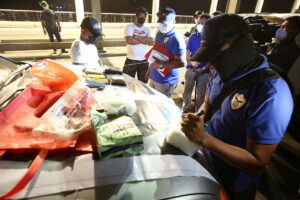By John Victor D. Ordoñez, Reporter
THE PHILIPPINES’ national police chief on Thursday quit his job after a call for hundreds of high-ranking police officers to resign and help cleanse their ranks of the “deep infection” of the illegal drug trade.
Philippine National Police (PNP) Director General Rodolfo Azurin, Jr. submitted his resignation letter to President Ferdinand R. Marcos, Jr., who appointed him chief in August.
“We in the uniformed service are trained and prepared and are expected to prioritize public service over public interest,” he separately told a news briefing streamed live on Facebook.
The police chief said he expects most colonels and generals to heed Interior and Local Government Secretary chief Benjamin C. Abalos’ call for them to resign.
Mr. Abalos on Wednesday urged all colonels and generals — about 300 in total — to resign after a probe found a handful of top police officers were involved in the illegal drug trade.
“I heed the call of the honorable secretary of the Interior and Local Government and the concurrent chairman of the National Police Commission,” Mr. Azurin said in his letter. “I am submitting my resignation from the police service voluntarily.”
He said he would allow himself to be evaluated and assessed by a committee created by the president to determine if he was in any way involved in the illegal drug trade, or if he had been tolerating rogue cops.
He said his resignation would be considered an application for his retirement, adding that he supports the Interior chief’s call to “rid the PNP of misfits and scalawags.”
Mr. Abalos earlier said those who submit courtesy resignations could continue working while their records were assessed by the committee. Those found guilty would have their resignations accepted, he said.
“If you’re not involved, there’s nothing to worry about,” he told a news briefing on Wednesday, adding that those who refuse to quit were deemed “questionable.” “This is the only way to cleanse the ranks in a fast manner. It’s difficult to fight a war when it’s your ally that will shoot you in the back.”
He said law enforcers had seized about P10 billion worth of illegal drugs in 24,000 drug operations last year. About 30,000 drug suspects were arrested in the first 100 days of Mr. Marcos.
Police had killed 46 drug suspects during illegal drug operations under the new administration, Mr. Azurin said in November.
Mr. Azurin said officers who are proven to have engaged in illegal drug activities would be sanctioned by the committee but would receive retirement benefits if eligible.
He added that colonels and generals submitting themselves to the committee’s scrutiny would help clear the names of those falsely linked to the illegal drug trade. “That’s why I am asking officials, let us submit ourselves for an assessment and an evaluation by an independent committee whose integrity has been proven.”
On Wednesday, National Capital Region Police Office (NCRPO) Regional Director Jonnel C. Estomo told a news briefing streamed live on Facebook top NCRPO officials had accepted the proposal.
Gerardo V. Eusebio, who teaches political science at De La Salle University, said the Interior department should instead work with the Department of Justice in prosecuting rogue cops and drug lords.
“While the gesture of PNP chief Azurin to submit his courtesy resignation may be viewed as commendable at first glance, the Department of Interior and Local Government (DILG) should still work with DoJ in reassessing and revisiting the country’s strategy in dealing with the drug problem,” he said in a Facebook Messenger chat.
Hansley A. Juliano, a political economy researcher studying at Nagoya University’s Graduate School of International Development in Japan, said resignations were unlikely to lead to meaningful changes in law enforcement agencies.
“This is just emblematic of how unwilling the government is in making due process more efficient and the move means nothing institutionally,” he said in a Messenger chat.
Justice Secretary Jesus Crispin C. Remulla in November vowed to prosecute more top-level police officers responsible for drug war killings.
He said he wanted to extend the Witness Protection Program to police officers who are willing to testify on extralegal killings committed under the anti-illegal drug campaign.
At least 25 policemen have been charged with murder in connection with ex-President Rodrigo R. Duterte’s anti-illegal drug campaign, Mr. Remulla told the United Nations Human Rights Council.
An inter-agency task force on extralegal killings had investigated at least 17,000 cops.
Data released by the Philippine government in June 2021 showed that at least 6,117 suspected drug dealers had been killed in police operations. Human rights groups estimate that as many as 30,000 suspects died.
“DoJ in collaboration with DILG should reassess its strategy to address its flaws in gathering evidence in drug apprehensions and ensuring that drug lords and their protectors are convicted,” Mr. Eusebio said.
